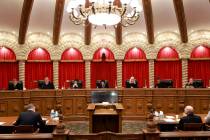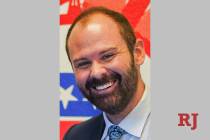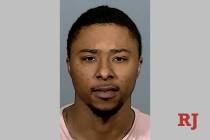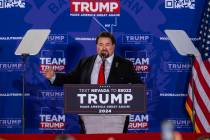Lawmakers consider cutting aid for problem gamblers
CARSON CITY -- Nevada lawmakers squeezed by a historic budget crisis are considering proposals to cut funds used to cope with the devastation caused by problem gambling, a byproduct of the state's top industry.
Republican Gov. Brian Sandoval proposes cutting in half money set aside to combat gambling addiction, and Sen. Ben Kieckhefer, R-Reno, has identified the remaining anti-gambling money as a potential source to reverse cuts to funds for treating autistic children.
The notion that Nevada, the nation's number one gambling state, would cut funding to fight problem gambling is troubling to people who have seen first-hand the damage addiction causes.
"For me it was huge," said Lori Flores, 40, a recovering gambling addict from Las Vegas, of state-sponsored treatment. "I had lost everything, my home, my car."
Flores, who is on probation for stealing $365,000 from her employer while she was gripped by addiction, said state assistance helps addicted gamblers who are unlikely to have money pay for services.
"It is a financial issue due to the fact we blow everything we have," said Flores, who has been in recovery more than three years. "We're pulling change from under car mats to put in the machines."
The Sandoval proposal calls for the state to divert half of a $2 fee applied quarterly to slot machines from problem gambling programs to the state general fund.
Under Sandoval's budget, overall problem gambling funding would fall from $1.5 million in fiscal year 2009 to about $738,000 in 2013.
Most of the cuts would be concentrated in research, data collection and work force development. But money for treatment would also decrease, from about $846,000 spent in 2009 to $663,000 in 2013. The treatment budget would bottom out in fiscal year 2011 at about $448,000.
Sandoval wants to limit general fund spending for 2011-13 to $5.8 billion, a 6.4 percent decrease from the amount spent during the previous two years.
The newly elected governor, who won by a landslide margin running on a promise to oppose tax increases, has proposed cuts to virtually every part of the state budget, including a 5 percent pay decrease for state workers, $162 million less for colleges and universities, and reductions to programs to help low-income parents of young children.
Dale Erquiaga, senior adviser to Sandoval, said the administration believes the proposed budget retains enough money from slot machine fees to pay for sufficient treatment.
"There is more money in the fee than the state uses," Erquiaga said.
Sandoval's proposed cuts are less severe than those suggested by former Gov. Jim Gibbons, who would have wiped out state-funded problem-gambling programs altogether.
And they are less dramatic than a proposal that cropped up during the 2010 special session of the Legislature when legislators considered sweeping the problem gambling money into the general fund to help make it balance. They ultimately decided to leave in place some treatment money.
Sandoval's budget is similar in that it retains money for treatment, but it would change the way the money is collected. Instead of collecting the $2 fee from machines and moving all of it into the general fund, the proposed budget calls for $1 to be set aside for treatment and the rest would go to the general fund.
"It just came down to there are other essential services they want to invest in at this point," said Mary Liveratti, deputy director of the Nevada Department of Health and Human Services. "At least with the dollar designated it helps us with planning going forward."
However there's no guarantee remaining fee revenue will stay in the budget. With legislators just 12 days into a 120-day session, they haven't come to a consensus on how to balance the budget.
Democrats have suggested taxes should be increased to raise money to avoid Sandoval's proposed cuts, but haven't identified which taxes or by how much they should be increased.
Republicans are focusing on ways to move money around underneath Sandoval's $5.8 billion limit to ensure their own priorities are funded.
Kieckhefer, a freshman, is troubled by proposed cuts to funding for autism treatment.
"I would be willing to take that other dollar in slot tax out of problem gambling and reallocate it toward autism services," Kieckhefer said. "If I see a problem gambler and an 11-year-old severely autistic girl sitting next to each other, I know which one I'm going to choose."
Rob Hunter, founder and director of the Problem Gambling Center of Las Vegas, said it would be a mistake to view cuts to problem-gambling programs as a long-term money saver.
Hunter said addicts will chase losses by gambling more, even if it means losing money they need to support their family and stay in their home.
"Families come apart, social services are needed," Hunter said. "They have lost money they can't afford to lose."
There are problem-gambling programs in Nevada that wouldn't be affected by cuts to state funding.
The Nevada Council on Problem Gambling offers a help line and a referral service and is largely funded by donations from the gambling industry.
And Gambler's Anonymous programs are available all over the state, with a heavy concentration in Las Vegas.
Flores hopes as much state funding as possible is preserved because most self-help groups don't have professional counselors who are critical, especially early in recovery.
Addicts "tend to hide a lot of our feelings," Flores said. Counselors "are going to call you out on it."
Flores credits the availability of treatment programs for a recovery that has allowed her to get married again and focus on raising two daughters and two stepsons.
"It completely changed my life. Now everything is about recovery versus running away from my problems," she said.
Contact reporter Benjamin Spillman at bspillman@reviewjournal.com or 702-477-3861.
HELP FOR PROBLEM GAMBLERS
Help is available online at nevadacouncil.org or by phone at 800-522-4700.























